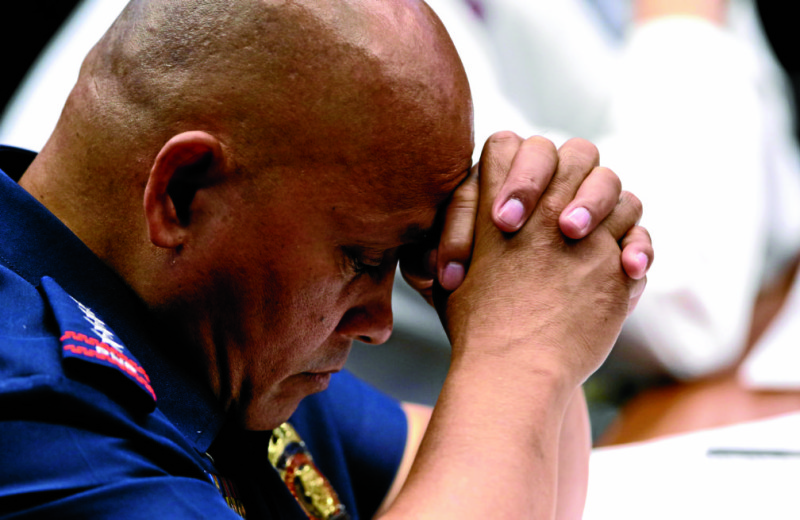
Chief Ronald Dela Rosa during the hearing of Committee on Justice and Human Rights at the Senate in Pasay City on alleged extra judicial killings amid the government campaign against illegal drugs.INQUIRER PHOTO / RICHARD A. REYES
An upbeat Sen. Leila de Lima closed the first two days of hearings on the issue of extrajudicial killings on a high note, complimenting the Philippine National Police chief, Director General Ronald de la Rosa, for taking part and for taking swift action, and promising to hold many more hearings in the future. Did she have reason to feel upbeat?
If the Monday hearing of the Senate committees on justice and on public order focused on those killed in the government’s so-called war on drugs, as symbolized by the presence of hooded witnesses, the hearing on Tuesday focused largely on the illegal drugs problem, as illustrated by De la Rosa’s PowerPoint slides.
It now seems clear, beyond a doubt, that some mistakes and abuses were made in prosecuting the war; the absence of the Bertes father and son, killed on July 7 while reportedly trying to escape detention, and the presence of the two policemen who allegedly killed them, now facing murder charges, helped define the parameters of those errors. The Commission on Human Rights investigating team’s corroboration of the details offered by the son’s live-in partner, about how they had been brutalized, made a deep impression. That the two police officers showed up in the Senate the following day without counsel was also puzzling.
It is also clear that the defense offered by some of the Duterte administration’s supporters, including Sen. Alan Cayetano, that media organizations were overstating the statistics, is mistaken. De la Rosa’s forthright assertion on Monday gave us a sum that was far higher than any of the media tallies De Lima referenced and Cayetano denounced: As of Aug. 22, the total number of killings since July 1, the day Duterte took office, stood at 1,779. This is a staggering number, and must be taken with great seriousness by all concerned, including the administration’s supporters.
It is clear that the campaign is making an impact on the illegal drugs trade. Sen. Panfilo Lacson, a former PNP chief himself, described the initiative against illegal drugs as enjoying a momentum, a success rate, unprecedented in police history.
It is also clear that, even as all the senators offered support for President Duterte’s crusade against crime and his campaign against illegal drugs, many of them had obvious preferences. There were senators like De Lima herself, and fellow freshman senator Risa Hontiveros, who chose to highlight the human rights aspect of the issue. There were senators like Cayetano and Manny Pacquiao, the boxing icon, whose questions and interventions were undisguised (or guileless) attempts to support what they thought was an administration line.
It is becoming clearer why De la Rosa is an effective champion of the administration’s war on drugs. It is not that he is articulate; in fact, at times, such as during his exchange with Sen. Gringo Honasan on Tuesday, his words threatened to come up short; it is rather precisely because he is not eloquent, that he is obviously a man of action, that recommends him to the rank and file. In that exchange, he gave vent to his feelings. Initially he stopped after saying he was frustrated, but encouraged by Honasan, he said, in Filipino: “We are only human. We feel frustration. We really want to do our duty as policemen, but we are also human…. We risk our lives, police face charges. We are also human and we are not perfect, so we ask that the treatment be balanced.”
It remains unclear where the estimates of the total number of drug addicts in the country come from. In the same way that President Duterte has referred to a Philippine Drug Enforcement Agency report, De la Rosa yesterday pointed to a Dangerous Drugs Board report, but that number is about 1.8 million. How this has, in the PNP chief’s words, “reportedly increased to 3.7 million,” should be studied.
When the hearings resume, that could be the first thing to resolve.

